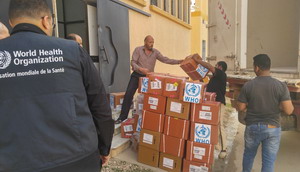 8 March 2018, Tunis, Tripoli – WHO delivered lifesaving anti-retroviral (ARVs) medicines for people living with HIV to the Benghazi Centre for Immunology and Infectious Diseases with support from the European Union.
8 March 2018, Tunis, Tripoli – WHO delivered lifesaving anti-retroviral (ARVs) medicines for people living with HIV to the Benghazi Centre for Immunology and Infectious Diseases with support from the European Union.
Life for people living with HIV in Benghazi has been further aggravated by the 7-year-old conflict, which has led to the gradual collapse of the health system limiting access to life-saving ARVs. The Benghazi Centre for Immunology and Infectious Diseases has witnessed one death as a result. Furthermore, 7 patients have been admitted to the intensive care unit with active HIV/AIDS and its complications due to the shortages of ARVs.
Most families of people living with HIV struggle to afford the cost of treatment. In Benghazi, more than 400 people living with HIV, including children, receive treatment at the Centre.
WHO has recently provided the Centre with ARVs sufficient for more than 400 patients to cover the treatment for a period of one year, including pediatric preparations. This is not the first shipment, WHO Libya provided the Centre with 2 shipments in the previous year.
“In 2018, more than 400 registered people living with HIV did not receive their treatment due to the acute shortage of the life-saving ARV drugs. This is a clear indication of the critical situation these individuals are going through,” said Dr Jaffar Hussain, WHO Representative in Libya. “WHO will continue to support life-saving interventions in Libya to alleviate the suffering of the people of Libya and extend its gratitude to European Union for its support to health services in Libya”
“We are working in partnership with the Ministry of health and the Benghazi Centre for Immunology and Infectious Diseases to ensure that the shipment of medicines and supplies, which will benefit over 400 people, are delivered to Benghazi,” said Dr Hussein.
WHO provides close follow up to ensure that donations are received in Libya and distributed to those in need. Together with the Ministry of Health, the WHO will continue working towards ensuring that everyone living with HIV has access to HIV treatment, protecting and promoting human rights and producing data for clinical decision- making.



